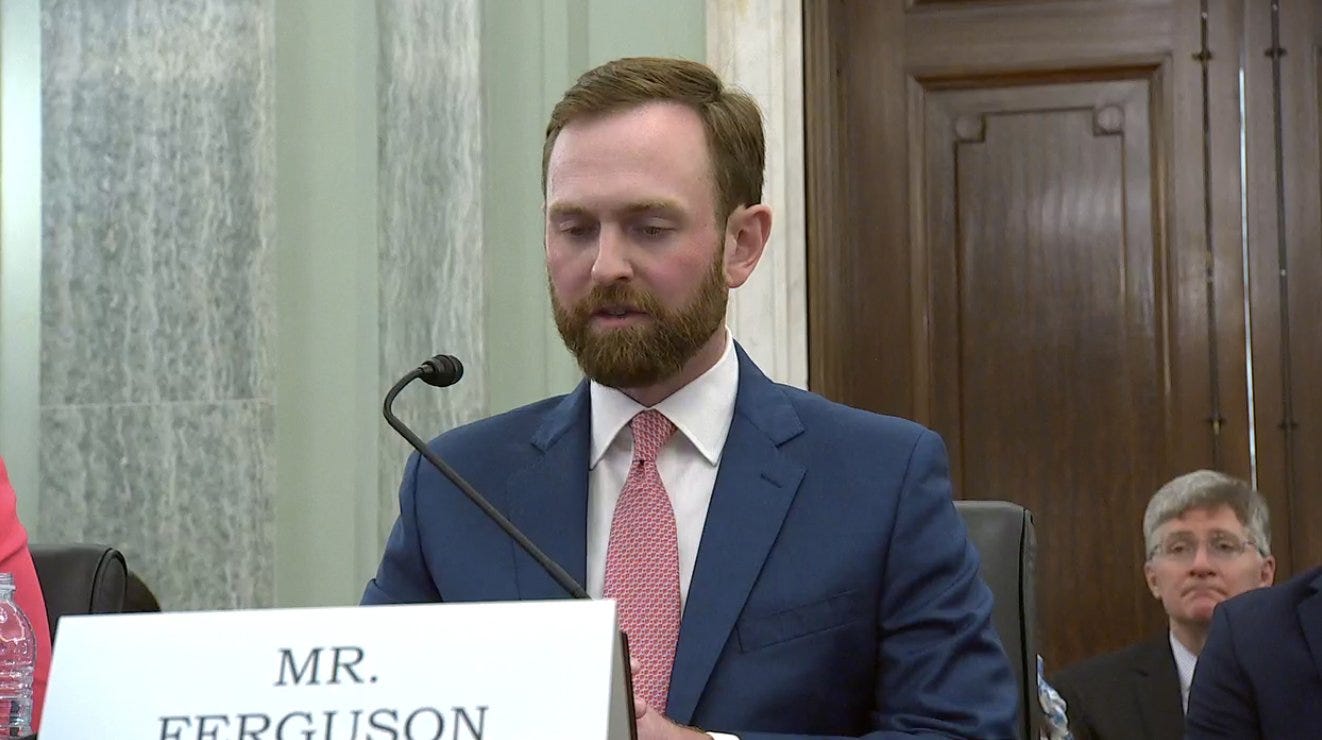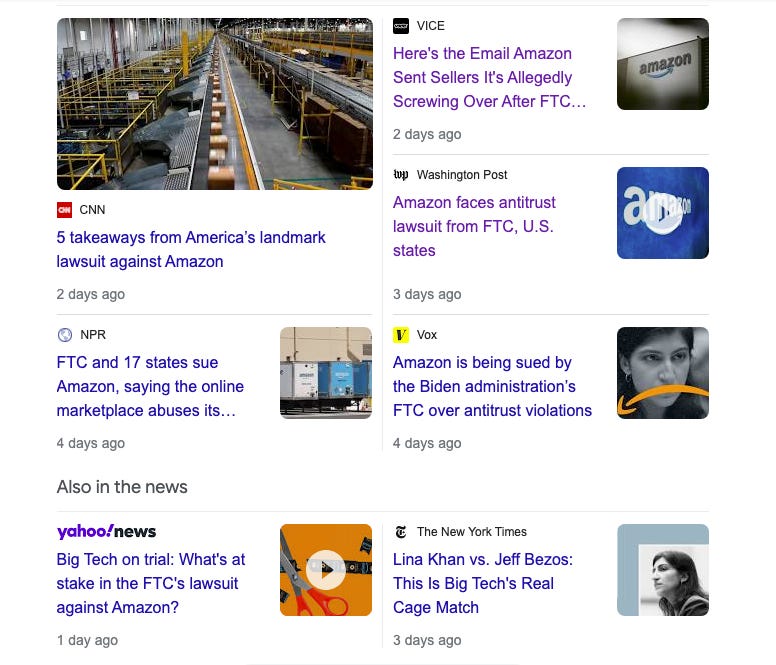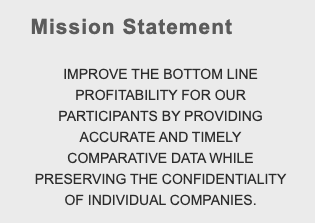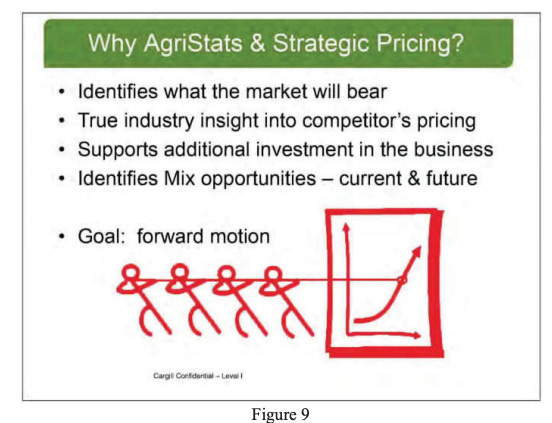"Never Seen Anything Like It:" The Biggest Month in Antitrust in 50 Years
The Google trial, an Amazon complaint, an attack on a private equity roll-up, a giant meat price-fixing suit, going after pharma cheating, and populist GOP antitrust nominations. Astonishing.
Welcome to BIG, a newsletter on the politics of monopoly power. If you’d like to sign up to receive issues over email, you can do so here.
Before the Biden administration, antitrust was mostly dead. It had picked up a bit under Trump, but mostly no one thought much about this area of law. And the reason was pretty simple. Nothing was happening. The FTC was using its authority to go after powerless actors, such as Uber drivers, church organists, bull semen traders, and ice skating teachers.
The changeover has been absolutely stark, and it’s accelerating. Many of my sources in the competition policy world are giving me the same message, which is that this is the most extraordinary month they have ever seen in antitrust.
There are the big fights, the cases against Google and Amazon, the suits against private equity and meat price-fixing. There is also smaller stuff, the behind-the-scenes institutional changes, like funding levels for antitrust enforcers and newly populist conservative nominees for regulatory agencies that could make a more assertive competition agenda part of a new bipartisan consensus. The rearguard opposition to change is immensely powerful, but the forces of the status quo are actually losing.
What’s also fascinating is that public interest and attention is going up, and that it matters. Practitioners in antitrust used to have to explain what they do, now they are being pestered with questions by friends and family. We’re also getting hints, ever-so-slight ones, that judges themselves are starting to think about corporate power.
There’s even price-fixing clip art! So let’s dive in.

To understand the relentlessness of antitrust actions over the last month, and their significance, it helps to go through the events in chronological order.
September 12: The $2 trillion Google antitrust trial begins. This is the first major monopolization case to hit the courts in 25 years, since Microsoft in 1998. Google’s 90% market share in search has allowed it to control not only the gateway to the internet, but also the future of technological deployment, including generative AI. The key question at trial, which I laid out back in August, is as follows. Why does Google have this monopoly? Google argues it’s because it’s a great search engine, the government argues it’s because Google pays everyone who preloads search to block rivals from access to the market.
We set up a site, Big Tech on Trial, and hired reporter Yosef Weitzman to write a daily recap from the courtroom. The trial has generally gone well for the government, with good evidence that Google thwarted competition from small firms (Branch Technologies) and big ones (Microsoft and Apple), using payoffs. Google has scored some wins as well, so it’s hard to know the outcome. Interestingly, the judge in the case, Amit Mehta, started off by deferring to Google’s demands for secrecy. But we’ve been advocating for more openness, and our pressure worked.
On Friday, Judge Mehta actually demanded lawyers do more questioning in open court, and not closed session. He’s also going to be unsealing testimony, and he told both parties that “he wants Microsoft CEO Satya Nadella’s testimony next Monday to be as open as possible.” It’s rare to have a judge change his mind, but that seems to be happening. A bit.
September 14: The Federal Trade Commission pledged criminal referrals and civil litigation for pharmaceutical executives that use a certain technique - known as ‘Orange Book fraud’ to lie about their patents and in turn block lower priced drugs. Orange Book fraud is costly. Know why certain asthma inhalers cost more than $100 apiece today vs just $15 a decade ago? It’s because of a form of routine fraud in how medical firms list various minor or sham patents, often involving medical devices. Fraud has always been illegal, but now the FTC is going to enforce the law.
September 20: The Senate Commerce Committee held a hearing on the new Republican FTC commission nominees. The FTC has five members, and two of them always belong to the minority party, in this case the GOP. The previous GOP commissioners, Noah Phillips and Christine Wilson, were corporate lawyers and hardcore libertarians. For instance, Wilson and Phillips voted against bringing Trump’s antitrust suit against Facebook, and against a rule that would bar labeling products as Made in the USA when they are made elsewhere.
Their replacements, Virginia Solicitor General Andrew Ferguson and Utah Solicitor General Melissa Holyoak, at least according to what they said during their nomination hearing, have a different philosophy. Ferguson bragged about being the counsel of record for Virginia in the Google ad tech monopolization suit, saying that Big Tech is the defining competition question of these times. "It is a lot easier for the government to control the conduct of the individual citizen,” he said, “if it only has to coerce a couple of market participants." By connecting consolidation to censorship, he is doing what pro-monopoly Republicans try to avoid doing.
Ferguson’s philosophy is clear - the anti-monopoly impulse and deregulation, he said, stem from the same root. It’s not my view, and he will break with Khan on a number of questions, but it represents a potential shift away from the libertarian pro-monopoly instinct of Wilson and Phillips.
Holyoak also comes from a public position in Utah, and not a corporate role. In her statement, she discussed supporting the Facebook suit that Wilson and Phillips opposed, as well as her work on the Utah v. Google lawsuit involving the Google Play Store. A mother of four, she’s attentive to the effects of surveillance on the family. "Kids should not have to give up all their data just to do their homework," she told the Senate Commerce Committee.
Both Ferguson and Holyoak carved out space to oppose the agenda of the Federal Trade Commission majority. Ferguson tread carefully around the language of conservative process debates, and I wouldn’t be surprised if he has constitutional objections to the FTC’s attempts to block unfair practices. Holyoak similarly is likely to seek more moderation in policymaking. That said, based on what they articulated, I do not think that either of them are nearly as hostile to governance as Wilson or Phillips. They have noticed the financial crisis, monopolization, excessive surveillance, and exploding health care costs. What does this mean? Well I’m not 100% sure. It’s not totally clear how they will carve out policy space, but it does seem that the future of conservative politics is no longer libertarian.
September 20: A judge in Tennessee added private equity firms Bain Capital and Charlesbank Capital Partners as defendants to the Varsity Brands cheerleading monopoly class action suit. Bain and Charlesbank are the owners of Varsity, and judges are wising up to financial games at this point by holding the actual people in charge accountable for what the firms they control are doing.
BIG is a reader-supported newsletter focused on the politics of monopoly and finance. If you haven't done so already, please consider supporting this work by upgrading to a paid subscription. The truth costs a few bucks, but in the long run it’s much cheaper.
September 20: Attorney General Merrick Garland advocates against a $50 million cut to the Antitrust Division’s budget. This was a seemingly tiny but very significant moment in a hearing in the House Judiciary Committee this week. Republican Congressman Ken Buck asked Attorney General Merrick Garland about funding for the Antitrust Division. There has been an attempt to cut $50 million from the Division, which is an 18% cut. This cut is largely coming from Senate Democratic staff who are annoyed that antitrust enforcers are getting a boost. Garland explicitly said he wants this money to go to the Antitrust Division, which will make it much harder to deny the funding.
This funding matters. The Antitrust Division is smaller than it was in the 1970s, and without the extra funding, it will have to cut the amount of investigations and cases it can bring. It is these kinds of institutional levers, more money for agencies, and GOP commissioners who actually want to tackle monopolization, that can meet the increasing anger coming from the public.
September 21: FTC goes after Amazon executives personally for deception of customers involving canceling one’s Prime subscription, which internally Amazon officials returned to as the Iliad, referencing the Greek poem about the lengthy Trojan war. Charging individual executives is making waves among corporate lawyers, who are very angry that the FTC is now targeting individuals at large powerful firms, instead of its historical track record of targeting the powerless
September 21: The Federal Trade Commission, with votes from Commissioners Alvaro Bedoya, Becca Kelly Slaughter, and Lina Khan, sued a New York private equity firm and its subsidiary, U.S. Anesthesia Partners, for rolling up and monopolizing the anesthesiology market in Texas.
I wrote this one up a few weeks ago, it’s a precedent setting case which caused PE types to say “well this is terrifying” and “this will cause shockwaves,” because it shows a very fundamental way that financiers operate - buying up a host of small firms and then raising prices across the board - is likely illegal. “A power grab against private equity threatens the US economy” is the headline of a piece in the Financial Times by Drew Maloney, the head lobbyist for private equity.
This suit also illustrates why American healthcare is so expensive. The excess profits in this scheme amounted to tens, or even hundreds of millions of dollars, in just one medical specialty, in just one state. Multiply that across every health care line of business, and that’s real money.
Interestingly, this roll-up also involves politics. Texas State Representative Tom Oliverson, an anesthesiologist by training, is on the board of U.S. Anesthesia Partners. Oliverson controls health care policy in Texas because he is Chair of the Insurance Committee and a member of the Health Care Reform Select Committee. There’s a big nest of politically connected U.S. Anesthesia Partners alums throughout Texas and Tennessee, and they use monopoly profits to finance their political power.
September 26: Amazon sued for monopolization. This was the big one for the FTC, as significant as the Google trial. While widely seen as a suit by the Chair, the complaint was voted out by Bedoya, Slaughter, and Khan. Sellers on Amazon are pretty happy about the complaint.
September 28: The Antitrust Division sues over meat price-fixing in the chicken, turkey, and poultry industry, alleging that 90% of the market is unlawfully inflated through a conspiracy run by a company called Agri Stats. For a long time, both farmers and consumers have noticed that prices for meat products at the supermarket aisle were high, whereas the prices paid to the producer of the animal were low. This ‘spread’ is what the processors get, and a high spread is often an indication of market power.
One key mechanism to foster collusion was Agri Stats. This corporation gathers pricing, production, and wage data from every firm in the industry, and then sells those same firms ‘consulting advice,’ essentially selling price-fixing conspiracies to meat processors. And this business model isn’t a secret - here’s the mission statement that today is on the webpage of Agri Stats.
As the Antitrust Division complaint reads, “An executive at Smithfield, a pork processor, summarized Agri Stats’ consulting advice in four words: “‘just raise your price.’” While the DOJ doesn’t include a complaint on this, there are also class action complaints about wage suppression, and I wouldn’t be surprised if processors use this data sharing to lower prices paid to farmers.
There are some pretty fun revelations in the complaint. For instance, at one point, a processor was thinking of unsubscribing from Agri Stats’ bacon report, until Agri Stats gave pointers on how the firm could raise prices on certain bacon products and earn an extra $100,000. Another interesting nugget is that meat processors were deliberating exporting meat at a loss to restrict domestic supply and keep prices up in America. “We continue to chase all the export opportunities we can find to keep excess product off the US market,” said a Smithfield exec.
It’s a pretty stunning complaint, complete with pictures. Here’s something from a sales slide deck from 2016.
I love price-fixing clipart!
September 29: There was a class action suit filed against CVS for cheating independent pharmacies. This one didn’t get a lot of notice, but it’s about a way that CVS Caremark, one of the largest pharmaceutical middlemen, ends up harming independent pharmacies by charging them excess and unpredictable fees involving Medicare prescription dispensing. I wrote up the problem last year.
The Merger Wave Is Over
Last summer, I noted that it takes time for agencies to act, but that they had put a bunch of torpedos in the water, and they would be exploding over the next year and a half. That’s exactly what’s happened. And the consequences are real. The most significant one is that the merger boom that started in the 2010s is now over.
You wouldn’t realize this success if you listen to the conventional wisdom in politics, because Wall Street is pushing a public narrative that antitrust agencies are losing in courts, and therefore they are losing their ability to stop deals. But this isn’t true, because if it were, you wouldn’t see regular reports from business publications lamenting the decline in deals, and writing things like “The average size of mergers completed is now at the lowest level in 20 years.” And you wouldn’t have deal-makers on CNBC calmly describing how hard it is to get mergers done.
The irony of this remarkable month of antitrust activity is that it’s both astonishing, far more bigger than anything anyone expected, yet it’s also only a tiny fraction of what is necessary to reverse the damage monopolists have done to our society. But it is a real start.
Thanks for reading! Your tips make this newsletter what it is, so please send me tips on weird monopolies, stories I’ve missed, or other thoughts. And if you liked this issue of BIG, you can sign up here for more issues, a newsletter on how to restore fair commerce, innovation, and democracy. And consider becoming a paying subscriber to support this work, or if you are a paying subscriber, giving a gift subscription to a friend, colleague, or family member.
cheers,
Matt Stoller






Matt, thank you SO MUCH for this review of the entire month’s action! I intend to share it with everyone I know! Having so much covered in one article makes for a good and powerful introduction to anti-trust issues for folks who might not know much about this area of the law--it highlights the broad impact of generations’ worth of ineffective or no anti-trust enforcement that lots of folks can relate to. More people need to understand the hidden impacts of monopolization and price fixing on things like food and healthcare.
Can you say more about this:
“…There has been an attempt to cut $50 million from the Division, which is an 18% cut. This cut is largely coming from Senate Democratic staff who are annoyed that antitrust enforcers are getting a boost.” Do we know which Democratic Senators have staff who are “annoyed that antitrust enforcers are getting a boost”? I think Democratic voters especially in every state should know which Democrats in Congress want to limit anti-trust enforcement, while all voters need a much better understanding of what’s at stake.
I graduated from UW-Madison Law School in 1987. I remember the intro anti-trust class had the smallest enrollment of any class. It was that way for over a generation, the Reagan/Bush era.